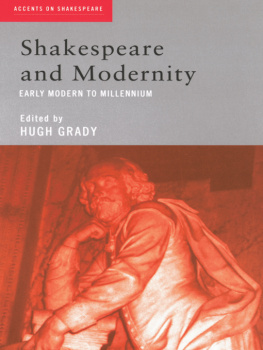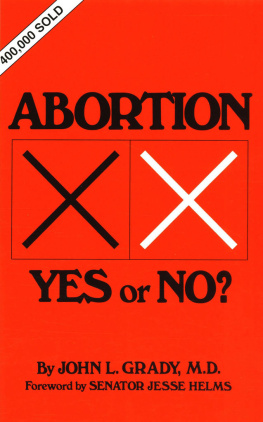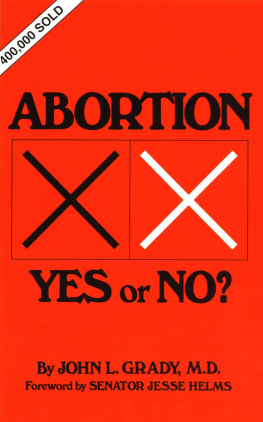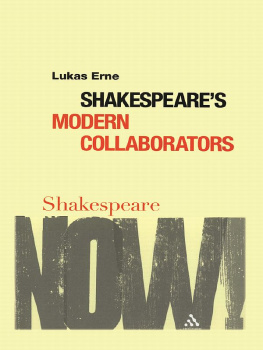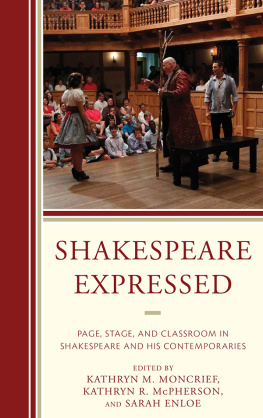Grady Hugh - Shakespeare and modernity: early modern to millennium
Here you can read online Grady Hugh - Shakespeare and modernity: early modern to millennium full text of the book (entire story) in english for free. Download pdf and epub, get meaning, cover and reviews about this ebook. City: London, year: 2000;2002, publisher: Routledge, genre: Romance novel. Description of the work, (preface) as well as reviews are available. Best literature library LitArk.com created for fans of good reading and offers a wide selection of genres:
Romance novel
Science fiction
Adventure
Detective
Science
History
Home and family
Prose
Art
Politics
Computer
Non-fiction
Religion
Business
Children
Humor
Choose a favorite category and find really read worthwhile books. Enjoy immersion in the world of imagination, feel the emotions of the characters or learn something new for yourself, make an fascinating discovery.
- Book:Shakespeare and modernity: early modern to millennium
- Author:
- Publisher:Routledge
- Genre:
- Year:2000;2002
- City:London
- Rating:3 / 5
- Favourites:Add to favourites
- Your mark:
- 60
- 1
- 2
- 3
- 4
- 5
Shakespeare and modernity: early modern to millennium: summary, description and annotation
We offer to read an annotation, description, summary or preface (depends on what the author of the book "Shakespeare and modernity: early modern to millennium" wrote himself). If you haven't found the necessary information about the book — write in the comments, we will try to find it.
Grady Hugh: author's other books
Who wrote Shakespeare and modernity: early modern to millennium? Find out the surname, the name of the author of the book and a list of all author's works by series.
Shakespeare and modernity: early modern to millennium — read online for free the complete book (whole text) full work
Below is the text of the book, divided by pages. System saving the place of the last page read, allows you to conveniently read the book "Shakespeare and modernity: early modern to millennium" online for free, without having to search again every time where you left off. Put a bookmark, and you can go to the page where you finished reading at any time.
Font size:
Interval:
Bookmark:

When ideas are in the air when they are developing through collective discursive processes that appear at first as individual, but are instead evolving in several separate places at once collaboration can be complex and many-sided. The present collection grew out of such a process and from ideas from several places. I want to thank especially Terence Hawkes, who encouraged this collection from its earliest gestation as an idea; Gail Paster and Barbara Mowat of Shakespeare Quarterly , who encouraged an article from me on Shakespeare and modernity which crystallized my own ideas on the issue; and Stephen Cohen, whose idea for a panel of speakers on the topic How modern was early modern? helped solidify one of the important subtopics of the collection.
This volume would not have been possible without the existence of the Shakespeare Association of America (SAA), whose annual meeting fosters the kind of creative collegiality and encourages the kind of collaboration represented here. At the annual meeting of 1998 I encountered talks by Eric Mallin and Linda Charnes on Shakespeare and the postmodern which were also among the early sparks for this collection. The 1999 annual meeting of the SAA was the site of a seminar co-chaired by myself and Lars Engle called Shakespeare and the boundaries of modernity, which saw the production and discussion of early drafts of most of the chapters included here. My thanks to all those who participated and spurred on the development of the contributions you are about to read.
My thanks as well to two Beaver College students, Margaret Stephan and Diane McDonald, who assisted me in much of the editorial detail work required to produce a critical anthology. Thanks also to Beaver English Department secretary Gwen Taylor for her expert assistance on issues of formatting and word processing.
Hugh Grady
Note
Unless otherwise indicated, all quotations from Shakespeare in the chapters that follow are taken from The Norton Shakespeare: Based on the Oxford Edition, general editor Stephen Greenblatt (New York: W.W. Norton, 1997).
Douglas Bruster is Assistant Professor of English at the University of Texas at Austin and author of Drama and the Market in the Age of Shakespeare .
Linda Charnes is Associate Professor of English and Cultural Studies at Indiana University, Bloomington and is the author of Notorious Identity: Materializing the Subject in Shakespeare .
Stephen Cohen is Assistant Professor of English at the University of South Alabama. He has written for the journals Criticism, Mosaic , and REAL: Yearbook of Research in English and American Literature .
John Drakakis is Professor of English at the University of Stirling and editor of several works in Shakespeare studies, including Alternative Shakespeares and Shakespearean Tragedy .
Lars Engle is Associate Professor of English and Honors Director at the University of Tulsa and author of Shakespearean Pragmatism: Market of his Time .
Lisa Freinkel is Assistant Professor of English at the University of Oregon and author of Reading Shakespeares Will: The Theology of Figure from Augustine to the Sonnets .
Hugh Grady is Professor of English at Beaver College and author of The Modernist Shakespeare: Critical Texts in a Material World and Shakespeares Universal Wolf: Studies in Early Modern Reification .
John J. Joughin is Senior Lecturer in English at the University of Central Lancashire and editor of Shakespeare and National Culture and of Philosophical Shakespeares .
Eric S. Mallin is Assistant Professor of English at the University of Texas at Austin and author of Inscribing the Time: Shakespeare and the End of Elizabethan England .
Charles Whitney is Associate Professor of English at the University of Nevada at Las Vegas and author of Francis Bacon and Modernity .
Introduction
HUGH GRADY
One of the many remarkable features of the four-hundred-year-old archive of writings about the plays of William Shakespeare is the frequency with which his work is termed modern. The only major exception occurs in the mid-twentieth century when, for a period of a few decades, a devaluation of the concept of modernity made it a feature scarcely to be prized in a figure of international prestige. Yet, as we begin the new millennium, it seems evident that new thinking about the nature of the topic and its implications has caused the question of Shakespeares modernity to move once more to the forefront of critical attention. This collection of chapters is dedicated to exploring the most important of those new ideas and to probing the issues at stake in Shakespeares relationship to that particular constellation of cultural events which has come to be known as modernity.
Of course, just what we mean by modernity is itself a crucial issue within several contentious debates of contemporary critical theory. In fact, it has by now become so complex and variegated a matter (especially since the acceleration of technical and social change characteristic of the past century) that words with the stem or root modern have proliferated. We now speak of the modern, modernity, modernism, modernization and the postmodern (with a number of possible variations for this last), sometimes as rough synonyms, sometimes to try to designate specific aspects of the cluster of ideas that has developed around the term. The result has been a confusion of terminology and a corresponding confusion of ideas.
But many of the modernist masterpieces Eliots The Waste Land and all of D. H. Lawrences novels, for example were passionate protests against a modernity which seemed to have spawned societies that were mechanical, soulless, fragmented, and generally injurious to the human spirit.
The term modern ity thus denotes a qualitatively new kind of anti-traditional society which arose in the West.modern are prisms through which to try to focus and understand important issues about what kind of society we live in, how we have developed historically, and how we can interpret the art, literature, and culture of the past. In the process, a culturally central figure like Shakespeare necessarily becomes a crucial focus of attention. It is no surprise to discover that critics have been arguing about his modernity for a long time.
To many in the nineteenth century and the decades just before and after it, Shakespeare seemed remarkably modern (in the words simplest sense), having been transformed by Romantic critic-poets, first in Germany, then in the rest of Europe (including Britain), into a nearly contemporaneous figure. Indeed, for German writers such as Lessing, Goethe, and Schlegel, Shakespeare functioned almost as a model: a figure to contrast with a French neo-classicism which had come to seem stultifying and mechanical. Where seventeenth- and eighteenth-century neo-classical writers had criticized Shakespeare for his ignorance of the so-called rules of drama and for lapses in diction and decorum, Samuel Taylor Coleridge, echoing the Germans and speaking for a new generation, asserted that Shakespeares judgment was equal to his genius and that his works were unique, almost organic structures of literary art unsurpassed in world literature. The Romantic Shakespeare, famous for his complex characters and poetic transcendence, reigned until the early twentieth century.
The German philosopher Georg F. W. Hegel crystallized for posterity the notion of Shakespeare as an inaugurator of modernity. Hegels comments on the individual plays were unremarkable; he saw them more or less as coexisting with the contemporary German dramas he occasionally discussed. But his complex, multi-valent systematizing philosophy enshrined the idea of a progression toward modernity and formalized the now widely accepted division of history into three broad epochs the ancient, the medieval, and the modern. Hegel attempted to show how politics, art, religion, and the human spirit itself all participated in an interconnected historical development, leading to increasing rationality and freedom. For him, Shakespeare, with his strikingly individualized characterizations, stood as a figure representative of an epochal new individualism and subjectivity characteristic of modernity. Hegels briefly sketched remarks on the Renaissance were fleshed out and developed in one of the most influential studies of the Renaissance, Jacob Burckhardts The Civilization of the Renaissance in Italy (1860). Burckhardt (1990) took Hegels generalizations about a new modern individualism and a new subjectivity and used them to open up and explicate the culture and art of Renaissance Italy from Petrarch to Michelangelo, explicitly treating the Renaissance as the beginning of a modernity defined by a new subjectivity. Shakespeare is mentioned only briefly in Burckhardts book (1990: 2045), but he is clearly associated with the central topics of individualism and subjectivity in ways that are still influential in our own time, as the chapters by Stephen Cohen and Douglas Bruster in the present collection illustrate. But this Hegelian-Burckhardtian-Marxist view was soon challenged by a number of the mid-twentieth-century proponents of what might be called a pre-modern Shakespeare.
Font size:
Interval:
Bookmark:
Similar books «Shakespeare and modernity: early modern to millennium»
Look at similar books to Shakespeare and modernity: early modern to millennium. We have selected literature similar in name and meaning in the hope of providing readers with more options to find new, interesting, not yet read works.
Discussion, reviews of the book Shakespeare and modernity: early modern to millennium and just readers' own opinions. Leave your comments, write what you think about the work, its meaning or the main characters. Specify what exactly you liked and what you didn't like, and why you think so.

